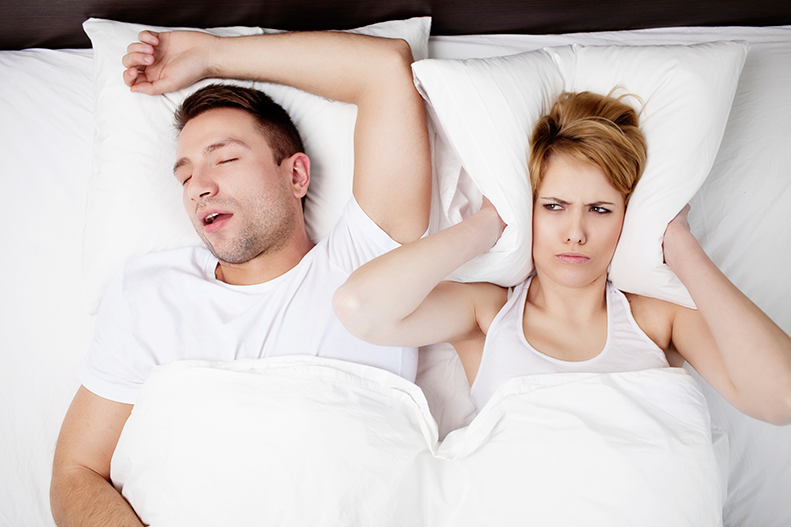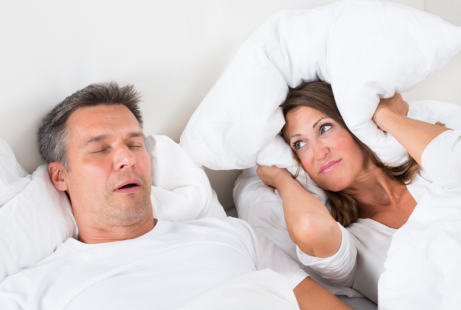Humans can enjoy or relax in various ways, but one must inevitably concede that “A Good Night’s Sleep” is among the most gratifying experiences one can have. Not only is it crucial, but one’s body needs it to function properly. While many of us believe that we have slept well for our recommended 7-8 hours, you may be dealing with an undiagnosed disorder. Before any further discussion, firstly we know what is sleep apnea and its symptoms.

What is sleep apnea?
One of the most widespread sleep disorders, sleep apnea, affects about 20 million adults, with an estimated 80% of cases going undiagnosed. Apnea, which is a Greek word, means “without breath.” A patient with sleep apnea experiences an involuntary cessation of breathing while asleep. Most of us might need to know that this could be the underlying factor in several emerging medical conditions. If left untreated for a long time, this could have adverse effects. It is a condition that occasionally results in breathing stopping while you sleep, which makes you snore loudly or make choking noises as you try to breathe. As the body slowly runs out of oxygen, the patient suddenly awakens. It is a common but serious condition that could make someone stop breathing once, twice, or even a hundred times while sleeping. The amount of air reaching your lungs is reduced due to the airway becoming repeatedly blocked.
There are some types of sleep apnea:
- Central sleep apnea (CSA) is when the brain fails to tell the system to breathe.
- Breathing is disrupted during obstructive sleep apnea (OSA) because of a physical blockage in the upper airways, most commonly caused by the tongue and soft tissues of the throat collapsing into the airway.
Comprehensive Sleep Apnea Treatment Solutions
1. Continuous Positive Airway Pressure (CPAP) Machines: CPAP machines are one of the most common treatments for obstructive sleep apnea. They deliver a continuous flow of air through a mask worn over the nose or nose and mouth, keeping the airway open during sleep.
2. Bi-Level Positive Airway Pressure (BiPAP) Machines: Similar to CPAP machines, BiPAP machines deliver air, but they adjust the pressure levels during inhalation and exhalation, making breathing more comfortable for some users.
3. Auto-titrating Positive Airway Pressure (APAP) Machines: APAP machines automatically adjust the air pressure based on the patient’s breathing patterns throughout the night, providing personalized therapy.
4. CPAP Masks: A variety of CPAP masks are available, including nasal masks, full-face masks, and nasal pillow masks, to ensure comfort and proper fit for different individuals.
5. CPAP Humidifiers: These devices add moisture to the air delivered by CPAP machines, reducing dryness and irritation in the airway, which can be especially beneficial for individuals experiencing nasal congestion or dryness.
6. CPAP Cleaning and Maintenance Products: Cleaning solutions, wipes, and equipment specifically designed to clean and maintain CPAP machines, masks, and accessories, ensuring hygiene and prolonging the lifespan of the equipment.
These products play a crucial role in managing sleep apnea effectively and improving the quality of life for individuals with this condition.
Sleep Apnea Symptoms and Signs Include:
1. Snoring
The most typical sign of apnea is loud, persistent snoring. It results from partial obstructions or blockages, preventing air from freely passing through the airways.
2. Breathing pauses or breaks frequently
When you have sleep apnea, the fatty tissues in your throat or tongue relax while you’re sleeping and fall into your airways, obstructing the flow of oxygen and preventing breathing for a few seconds.
3. Daytime fatigue
There is a common misconception that because you slept for 7-9 hours, you had good quality sleep. This is a myth! Your quality and quantity of sleep each night will suffer greatly from all of those pauses and interruptions. Excessive daytime sleepiness is one of the most prevalent and frequently disregarded signs and symptoms of sleep apnea (EDS). EDS is a medical condition that causes extreme daytime fatigue.
4. Headache
If you frequently experience headaches during the day or wake up with one, it may be a sign that your sleep is of poor quality. When you repeatedly stop breathing throughout the night, your brain receives little to no oxygen. Vascular headaches are brought on by the widening of blood vessels by low oxygen levels.
Conclusion
Sleep is essential for a person’s health and well-being, just like food, air, and water are. One of the leading causes of many health problems is a lack of sleep. Therefore, you must schedule an appointment with Life Kare to get treatment immediately if you are experiencing any of the abovementioned issues of sleep apnea. We provide the best services and advanced respiratory care.
